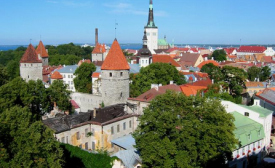soft power

TALLINN --- Estonia’s capital seems a peaceful place. Tallinn’s cobblestoned streets are lined by medieval walls and towers, and tourists stroll amid churches and coffee shops. But Estonians live in a rough neighborhood; their eastern neighbor is Russia, which has never fully accepted that Estonia prefers the company of EU and NATO countries.
After more than six decades of strife, a senior adviser to Iran's leadership has signaled the country's openness to a profound and historic strategic change in Iran's relations with the West. A brief letter from US President Obama offering potential relief from international sanctions in return for a swift agreement regarding Iran's controversial nuclear program has been reportedly answered by an equally brief and amicable note from Iran's moderate new president, Hassan Rouhani.
Around the world, international education has become a policy priority for almost every developed and developing country. But just how significant is higher education to a country’s reputation and what exactly is soft power?
In our series of letters from African journalists, a week after it was announced that vast quantities of underground water had been discovered in Turkana - an arid, poor region of Kenya where oil was also recently found - Joseph Warungu considers the East African nation's knack for making history. Kenyans have a unique talent for firsts - whether good or bad.
The business world is awash with talk of soft power. It is, say gurus and thinkers, the key to durable success and it's largely thanks to women that the trend has risen to prominence. But what is it? Well, simply put, soft power is the application of emotional intelligence.
From Haiti to Japan to Egypt, digital natives have reshaped society by bringing ideas to life with the touch of a button. In his latest book, analyst John Zogby characterizes the Millennial generation as “the First Globals”—the first generation to truly view themselves as part of a global citizenry above the old boundaries of traditional nationalism. For these “First Globals”, the world is their oyster, and a passport their ticket to success.
Germany's elections may be generating shrugs of apathy at home, but they are being watched closely by electorates and governments all around Europe, who know that these elections perhaps matter more to Germany's neighbours and partners than they do to its own citizens. From the Mediterranean countries, with their shell-shocked economies, desperate for a bit of respite from austerity, to the northern nations wondering how serious Angela Merkel is about institutional reform of the European Union, a whole continent is waiting to see how the votes come in, and what it will mean for them.
The new results are in. The US, for all its riches, stands just 17th in the new world happiness rankings released today in the World Happiness Report 2013. Denmark tops the world tables. Indeed, there is something good going on in the northern latitudes. The top five countries are Denmark, Norway, Switzerland, Netherlands, and Sweden.







